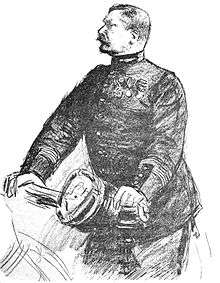Hubert-Joseph Henry
| Hubert-Joseph Henry | |
|---|---|
 Henry at the 10th session of the Zola trial, 1898, by Louis Rémy Sabattier for l'Illustration | |
| Born |
2 June 1846 Pogny, Marne, France |
| Died |
31 August 1898 (aged 52) Fort Mont-Valérien, Paris, France |
| Nationality | French |
| Occupation | Soldier |
| Known for | Forgery related to Dreyfus affair |
Hubert-Joseph Henry (2 June 1846 in Pogny, Marne – 31 August 1898[1] at Fort Mont-Valérien) was a French Lieutenant-Colonel in 1897 involved in the Dreyfus affair. Arrested for having forged evidence against Alfred Dreyfus, he was found dead in his prison cell. He was considered a hero by the Anti-Dreyfusards.
Early life and career
Hubert-Joseph Henry was born into a farming family. He enlisted in the French Army as an infantryman in 1865. Promoted to sergeant-major in 1868 Henry served in the Franco-Prussian War, escaping twice as a prisoner of war. In 1870 he was commissioned as a lieutenant in an infantry regiment. In 1875 Henry was appointed as an aide to General de Miribel, Chief of the General Staff. Four years later Henry, now a captain, joined the Statistics Section of the Ministry of War - the office responsible for counter-intelligence. He subsequently served in Tunisia, Tonkin and Algeria before returning to counter-intelligence duties in Paris.
Dreyfus affair
In August 1898 Godefroy Cavaignac ordered Captain Louis Cuignet to examine the documents which sent Captain Dreyfus to his exile from France to Devil's Island. This matter should have been brought before Parliament but due to Cavaignac's nature the Minister threw caution to the wind. Cuignet soon learned that the most damning evidence brought to the court in 1896 by Henry was in fact a forgery using two separate documents, later known as the "faux Henry," to achieve the sentence he and his supporters desired. Henry was called in for questioning on 30 August by Cavaignac and managed to protest his innocence for only an hour before he confessed. This led to the resignations of Generals de Pellieux and de Boisdeffre, who admitted having been duped by the forgery.
Imprisonment and death
Henry was sent to the military prison at Fort Mont-Valérien. The day after he arrived he began to write: to his wife, "I see that except for you everyone is going to abandon me"; to his superior General Gonse, "I absolutely must speak to you"; in one cryptic comment declaring his guilt he wrote "You know in whose interest I acted." The meaning of this comment has never been explained; it may have referred to Ferdinand-Walsin Esterhazy, who was the actual author of the bordereau document, which had been used to arrest Captain Dreyfus, or perhaps to Lt Col Sandherr, another superior who passed on the bordereau to other high-ranking officers, such as the Minister of War, General Auguste Mercier.
While halfway through a bottle of rum and midway through another letter to his wife, Hubert-Joseph Henry wrote "I am like a Madman" and proceeded to slit his throat with a shaving razor. On the day of his arrest the Colonel had been searched and no razor had been found; this sparked another outcry of murder, however due to Henry's actions, letters and state of mind, a cause of suicide was declared.
Post-death and the Henry Monument
At first anti-Dreyfusards such as Edouard Drumont and Henri Rochefort upon hearing of Henry's suicide felt as though it was as good as declaring the guilt of a forged document and therefore Dreyfus' innocence to the people of France. However, a Royalist newspaper titled La Gazette de France praised their former conspirator for sacrificing his life for the Fatherland. Charles Maurras declared that the 'gallant soldier's' forgery stood among his "finest feats of war".
The Henry Monument was a national fund drive for the legal defence of Henry's widow in the preservation of the Henry family name. Over 130,000 francs were raised and the comments that signatories contributed were released in book form in 1899 filling more than 700 pages. Though not all comments expressed anti-Semitism, many did.
References
Bibliography
- France and the Dreyfus Affair - A Documentary History, Michael Burns